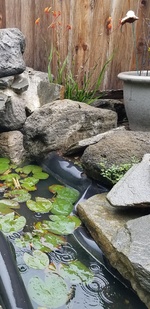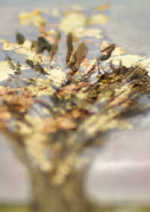Dormancy and Aspirations
 Wednesday, April 27, 2016 at 11:44PM
Wednesday, April 27, 2016 at 11:44PM 
"The universal principle of etymology in all
languages: words are carried over from bodies
and from the properties of bodies
to express the things of the mind and spirit.
The order of ideas must follow
the order of things."
~Giambattista Vico
In the time since we last shared a few words, creativity has me trying on a bunch of new hats.
Let me share with you now just one of the colorful examples with this evolution of a poem.
While in a bit of a stasis, I wanted to move forward with the creative flow. Finding myself with an opportunity to explore, the following began to happen: Pen in hand, I grab a post-it note and a few words in the style of haiku come up in response to my curiosity about the stillness I'm currently experiencing.
Cycles go dormant
Growth is imperceptible.
Hibernation mode.
The rain falls mid week, sandwiched between sweltering heat.
^^ That sentence alone, when examined etymologically, fascinates me.
I only search for the etymology of origins for some words, on some occasions.
This particular occasion,
I was searching for the roots of a feeling of slowed growth.
Which led me to abeyance:
abeyance (n.) Look up abeyance at Dictionary.com
1520s, from Anglo-French abeiance "suspension," also "expectation (especially in a lawsuit)," from Old French abeance "aspiration, desire," noun of condition of abeer "aspire after, gape" from à "at" (see ad-) + ba(y)er "be open," from Latin *batare "to yawn, gape" (see abash).
and of course, of feeling dormant:
dormant (adj.) Look up dormant at Dictionary.com
late 14c., "fixed in place," from Old French dormant (12c.), present participle of dormir "to sleep," from Latin dormire "to sleep," from PIE root *drem- "to sleep" (cognates: Old Church Slavonic dremati "to sleep, doze," Greek edrathon "I slept," Sanskrit drati "sleeps"). Meaning "in a resting situation" (in heraldry) is from c. 1500. Meaning "sleeping' is from 1620s.
The poem had already organically arrived, and I was looking to substitute the word stagnant that had first come in to be 'place filler' until I could search for the correct word.
Stagnant was not quite right. As that implied decay and inability to respond.
I am not in a place of stagnancy, more of a receptive and aware inaction.
So yes, the dormant cycle fits much more gracefully ~and bonus; it was also two syllables! =haiku
I had chosen the word that felt right,
updated the title of this particular post,
typed up the revised poem,
and proceeded to move on from there.
That is when the haiku-inspired tradition of recognizing the season (and elements -i.e., rain) around me followed.
Thus the weather update arrives.
I wonder to myself how the last few minutes of etymology synthesized to become that sentence.
~Because it wasn't actually sweltering last weekend,
and since next weekend has yet to arrive,
I truly can't predict beyond the weather forecasts just how sweltering it may or may not be.
It is predicted to be very hot this weekend anyway, and once the actual 'midweek' observation arrived,
book-ending the (actual) rain with the 'sandwiched between' metaphor felt 'cyclical', so I went with it.
~Cycles being a choice word to use for juxtaposition.
Looking to further describe the heat,
I think even I began to swelter.
In retrospection, that rising heat now appears to have emerged from that place of abeyance this entire post had originated from.
I began to notice how the words were arriving,
and I was then checking in on the motivation behind the words that appeared.
By searching for the word's origins.
Not only etymologically, but genuinely.
From within my frame of reference, and from my current energetic vibe, so to speak.
That is why the sentence became a bit of a fascination to me,
you see.
It clued me in to all of the keywords that the etymology brought
to the surface for me to examine.
In essence,
I was observing the fertilizing of a poem.
swelter (v.) Look up swelter at Dictionary.com
c. 1400, "faint with heat," frequentative of swelten "be faint (especially with heat)," late 14c., from Old English sweltan "to die, perish," from Proto-Germanic *swiltan- (cognates: Old Saxon sweltan "to die," Old Norse svelta "to put to death, starve," Gothic sviltan "to die"), perhaps originally "to burn slowly," hence "to be overcome with heat or fever," from PIE root *swel- (2) "to shine, beam" (see Selene). From the same ancient root comes Old English swelan "to burn." For specialization of words meaning "to die," compare starve. Related: Sweltered; sweltering.
From there, I look back upon the sentence that prompted me into this extended illustration of a process:
The rain falls mid week, sandwiched between sweltering heat.
I would like to revise that to become a continuation of the opening haiku by altering the irrelevant word 'sandwiched' to fewer syllables,
and chose to go the easy route with the word 'in' as substitute..
And thus, I find myself no longer inactive, but smack dab in the middle of the poetic stream/cycle once more.
Etymology is now burning off the initial overall feeling of dormancy and inaction,
and the slow burn and appearance of death in the sweltering heat gives birth to a new page in a journal of a life.
The rain falls midweek,
in between sweltering heat.
The last five syllables will encompass the entirety of this process.
effectively completing the cycle.
And there we have it; a two verse poem in an abstract style of haiku is formed.
Cycles go dormant
Growth is imperceptible.
Hibernation mode.
The rain falls midweek,
in between sweltering heat.
Observing nature.
~ncb
Giambattista Vico. (n.d.). BrainyQuote.com. Retrieved April 28, 2016, from BrainyQuote.com Web site: http://www.brainyquote.com/quotes/quotes/g/giambattis185260.html
 Poetry
Poetry 


Reader Comments